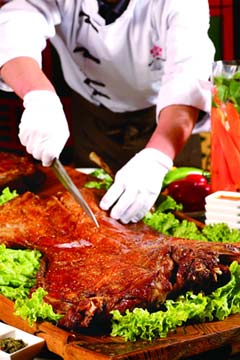

|
 |
|
Roast whole lamb is one of the most popular lamb dishes in the country. Photos by Ye Jun / China Daily |
Located along Shichahai Lake, Kaorouji is a restaurant where one can experience how Beijingers grilled lamb in the 19th century. The restaurant, founded in 1848, still has a traditional round table with a huge round iron grill for customers to cook the lamb with a long pair of chopsticks.
Dong Keping, a Beijing-based gourmet, says lamb was China's main meat by the time of the Yuan Dynasty (1271-1368). Yinshan Zhengyao, a book on food and recipes written in 1330, recorded mostly lamb dishes, and just a few beef dishes, but no pork dishes. Its author, Hu Sihui, was a Yuan Dynasty nutritionist working for the imperial family.
Pork became widespread in most parts of China only after the start of Qing Dynasty, according to Dong. "That's because Manchu people used pork for sacrifice, and the imperial family would give sacrificed pork to court officials, as an honor. That has helped it become China's national meat," says Dong, a culinary advisor for the CCTV's food documentary A Bite of China.
Although pork became dominant, lamb dishes still remain in most parts of China.
Lamb is cooked in almost every way — boiling, stewing, roasting, frying and braising.
Traditional Chinese medicine doctors believe lamb is warm and nourishing and especially good in the cold winter. In fact, they even use it as medicine to improve deficiency of energy, and pain in the stomach in cold weather. Lamb soup with angelica and ginger is a recipe that has been recorded in medical books since Eastern Han Dynasty (AD 25-220).
Australian David Pooley, executive chef with Western cuisine restaurant Aria in Beijing, says lamb is one of Australia's national meats, ranking second in restaurant consumption, only behind beef.
He says that in Australia it is traditional to cook a leg of lamb on Sunday night, along with roast potato, at a family gathering.
Different parts of the lamb are cooked differently. Lamb loin should be prepared very quickly, according to the chef. He prefers to braise top of the shank, roast lamb rump slowly, and grill or roast lamb rack quickly.
Unlike Chinese chefs, Pooley says he almost never cooks a lamb well-done, because it can become too dry. "But moms always cook it well-done, and there is something nice about it," he says.